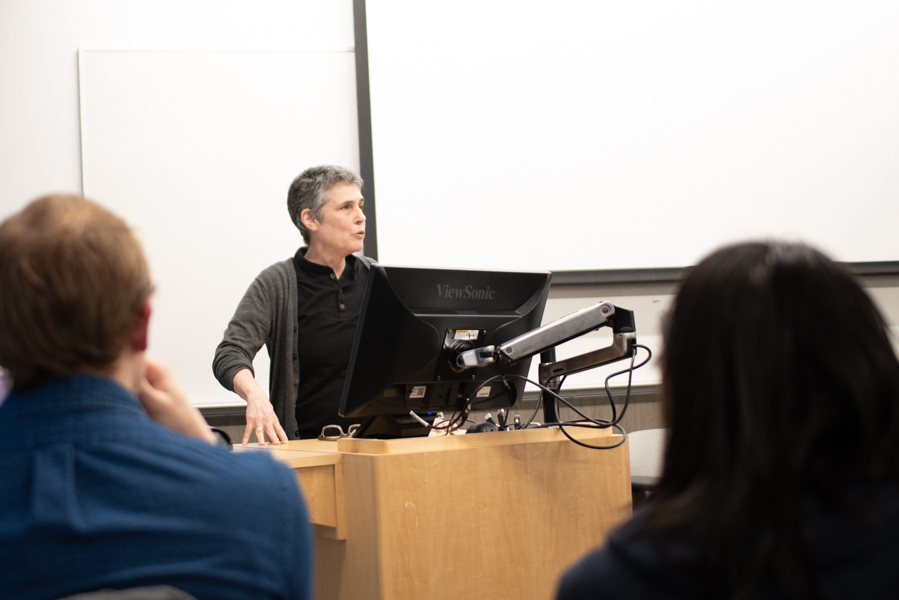Graduate students call for guarantee to sixth-year funding at forum on budget deficit
Julia Esparza/Daily Senior Staffer
Political science Prof. Jackie Stevens speaks to faculty and graduate students. Stevens said the University is not prioritizing education when considering budget cuts.
February 21, 2019
Graduate students, professors and faculty members packed a classroom in Kresge Hall on Wednesday night raising concerns about the University’s deficit, sixth-year doctoral funding and future collective action.
Hosted by Northwestern University Graduate Workers in partnership with NU’s chapter of the American Association of University Professors, the forum dissected university funding and how it affects graduate students. Andrew Hull, a graduate student in the philosophy department, gave an overview of University funding, outlining the ways the endowment and its interest is used.
“We are asking for guaranteed funding … so that faculty and graduate workers don’t have to go through this whole year wondering month by month what their funding situation is going to be,” Hull said. “While we are dealing with loads of uncertainty, clearly the balance books aren’t.”
Hull claimed the University is portraying its financial situation to seem more perilous than it really is, and predicted that the University will rebound quickly from losses taken on due to the construction of various multimillion-dollar buildings in the past few years.
University leadership has expressed confidence that NU is financially strong and will return to non-deficit status in 2021, and claimed that the deficit arose from a variety factors, including construction projects and increases to financial aid. Top administrators have also said they are trying to limit the impacts of spending cuts on students and research.
But Hull said that the University has thrown funding for sixth-year graduate research, which used to be “all but guaranteed,” into question. He said the funding is not a new expenditure, but the administration “refuses” to officially include it in their budget to avoid committing to delivering the money.
“We are calling for the University to actually be honest in this financial report,” Hull said, “and to finally budget for (sixth-year funding) and to finally guarantee it for us and not just to dangle it.”
The Graduate School Dean Teresa Woodruff said last May that sixth-year funding for assistantships had previously been granted due to exceptions of the school’s policy, but that TGS would no longer make exceptions to the policy.
The University has previously said they hoped to protect research funding despite the deficit.
“We want to protect the academic core as much as possible,” Provost Jonathan Holloway said in an October interview with The Daily.
A major concern echoed by many graduate students was the uncertainty they face in terms of funding their sixth year of study. Hull himself is a fifth-year PhD student and said much of his time now is consumed with applying for fellowships. He said this stress detracts from the time he is able to dedicate to his role as a teacher.
Political science Prof. Jacqueline Stevens said officials are using the deficit to justify these budget cuts for graduate research. Under its current investment strategy, the University’s financial situation will rebound within a few years, she said.
“Since the purpose of the investment is not to make money per se but to support the mission of education, there is no need to worry about short-term losses,” Stevens said.
Stevens also charged that the University prioritizes its large endowment because members of the Board of Trustees members are involved in corporations that prioritize business advancement over education.
The University has previously stressed that much of the endowment funds are tied to predetermined spending requirements as specified by donors, which provides little leeway to spend on other areas of Northwestern’s operations. But Stevens claimed most funds are not restricted and the ones that are still fall under broad categories.
The University drew 6 percent from the endowment last fiscal year to pay off part of the deficit, though Craig Johnson, the vice president for business and finance, called spending above its typical annual level of 5 percent “unsustainable.”
Spanish and Portuguese Prof. Jorge Coronado raised concerns about how the deficit is affecting the classroom. He said within his department, budget cuts have deterred interdisciplinary collaboration and decreased the number of professors able to instruct language courses, which continue to increase in enrollment.
Coronado, who is president of the NU chapter of AAUP, said collaborations like this forum are important opportunities to unify people across departments and roles.
“I see that as a step towards considering the sorts of effects that the budget cuts are having, not just in the smaller examples but much more broadly,” he said.
Email: juliainesesparza2020@u.northwestern.edu
Twitter: @juliaesparza10
Related stories:
— Ratings agency identifies bleaker financial outlook for Northwestern
— Almost a year later, a look back on how the budget deficit has impacted the University



